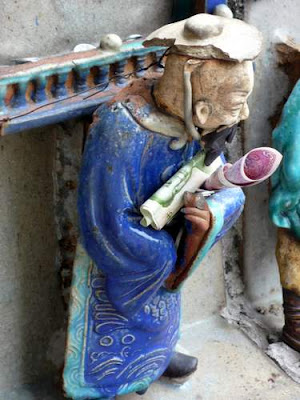 Dear Gentle Reader,
Dear Gentle Reader,It's 3WW time, again.
This week the prompt words (for prose or poetry) are brazen, hunger, and nuzzle.
...I think I know what Thom, keeper of the words for 3WW, was thinking about this week...
Your starter is a titled picture with, as always, a description if you run your mouse over the image.
Then, as usual, I serve up three haiku/senryu, each with an American Sentence title.
Sometimes the poetry is annotated, in green (sometimes heavily, sometimes not).
For dessert, a musical offering.
If you're like me, have dessert first and enjoy it while reading.
So, away.
...I have to get back to unpacking...
...And rebuilding furniture...
...And moving boxes only to move other boxes in a maddening, real-life Tower of Hanoi puzzle in Hong Kong...
We are in the midst of moving and we have too much stuff.
At least the Internet was reinstalled today...
And, with that, let the games begin with brazen, hunger, and nuzzle...
Glance, gaze, hunger; eros pants, desire trips up logic, andweleavequickslicksideslipslideslicksbrazennuzzlelovehunger...and the night's still young...Better than a cup of no tea is a breast with no cover; pop Zen.Tantric zen hunger;Zen--bra or no bra (zen-ness).Nuzzle breasts. Or not.I have had fun playing with (the ideas of) religions for the last few years, and am heading off, shortly, for Japan, land of Zen and Zen koans.The Japanese, like your humble scribe, have been known to enjoy both fleeting moments and the expression of ideas regarding those moments.From the Zen practice 'The Art of Tea' we get the famous Japanese saying "Ichi-go ichi-e" which relates to the idea that every moment is transient and that mindfulness is important as after a moment has passed it is gone forever.Even the art of drinking tea allows a Zen adept to found schools of thought devoted to simple moments, like making or consuming tea... the Art of Tea.After all, mindfulness allows one to find beauty and awareness in everything, even in the preparation and enjoyment of tea.The Japanese love their tea; one Japanese proverb is that "If a man has no tea in him he is incapable of understanding truth and beauty".In Japanese zazen philosophy, words are encumbrances to the expression of thought. The idea itself is considered central and physical experience can no longer be adequately expressed by words--or be as powerful as the ideas about that physical experience.This is where I, sometimes, part ways with Japanese zazen philosophy.The concept of ideas trumping experienced reality is why zazen monks extol the virtues of drinking, and savouring (in their mind), a cup of no-tea.These monks are concentrating on the essence of tea without worrying about the minutiae of actually drinking tea.I know that these are monks, but what would they think of sex? This is what I want to know.So, I started wondering, as one does, and as I was playing with words for 3WW, what tantric Zen sex would be like.Would Zen monks even need to touch?Would they enjoy the idea of sex as much as the Zen adept enjoys his cup of no tea?And how much enjoyment would that really provide?Would the idea more than compensate for the actual experience?I, Gentle Reader, know that I would never accomplish this--I like the real thing.I know my limitations.I would play with Zen but stay with sophistry and try to trick girls out of their bras, insisting that the Zen bra, the idea of a bra negating the need for a 'real' bra, was sufficient.(I think that a young Plato might have appreciated this idea in the dark cave of his mind...)And, then, I would likely leave the monastic life once I had convinced young women of the beauty of no Bra.And that was the sole point of this particular haiku.Much ado about nothing, some would say.Or about everything, as I might say.I might not be mindful of every moment, but some... well... enough said.Every day, every hour, desire consumes, hunger wracks mind, soul, body...Clean Hunger. Honestgreed, desire. Brazen nuzzle.Sucks teat, milks Mom's love.
Chris
Ah... and the music for today is...
Click to hear Danny Elman's 'Etiquette Lesson' from the 1990 film 'Edward Scissorhands'
Amazon.com
Tschuess,
Chris
Click to hear Danny Elman's 'Etiquette Lesson' from the 1990 film 'Edward Scissorhands'
Amazon.com
Tschuess,
Chris













